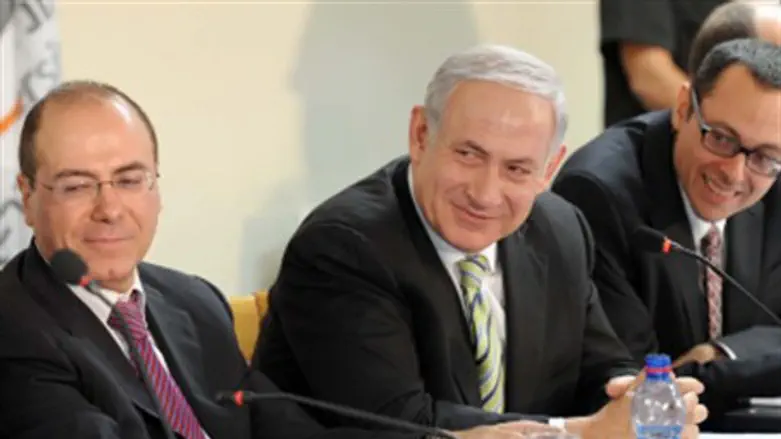
Prime Minister Benjamin Netanyahu on Wednesday accepted the recommendations of Public Security Minister Yitzhak Aharonovitch and Justice Minister Yaakov Neeman for dealing with disturbances in Judea and Samaria.
The ministers formulated the recommendations after meeting with ISA, IDF, Israel Police and State Attorney's Office teams, which were:
- The immediate issuing of administrative detention orders against rioters;
- Immediately increasing the number of those barred from various areas;
- Trying rioters in military courts;
- Giving IDF soldiers the authority to detain people; and
- Increasing both the number of special ISA, Israel Police, IDF and State Attorney's Office investigation teams and the resources for investigations.
However, Netanyahu rejected the recommendation that 'rioters' be classified as terrorists.
The recommendations come one day after an emergency cabinet meeting was convened to discuss a riot by some 50 angry Jewish youth at the Ephraim Brigade headquarters late Monday, during which the rioters clashed with soldiers and hurled Molotov cocktails and stones at IDF vehicles.
Netanyahu vowed to stop violence directed at the IDF.
Prime Minister Netanyahu told reporters, "Those who raise a hand against IDF soldiers or Israel Police personnel will be punished severely. Those who rioted at the IDF Ephraim Brigade base are like those who riot in Bilin."
"It is important to me to emphasize that this is a small group that does not represent the public that lives in Judea and Samaria, who are loyal to the state and its laws and who condemn the rioting," Netanyahu added.
The incident has been overwhelmingly condemned by community leaders and rabbis in Judea and Samaria who described the riot as "shameful and disgraceful."
Also on Wednesday a delegation of Rabbis from Samaria led by Sephardic Chief Rabbi Shlomo Amar met with Ephraim Brigade commander Col. Ron Kahane and his officers to express their solidarity with the IDF. During the meeting they unequivocally stated attacks on IDF personnel were a grave sin proscribed by the Torah.
However, they also criticized Israel's political echelon for using the IDF – the army of the people – to settle internal political disputes.
During 2005 disengagement from Gaza observers predicted that using the IDF to destroy Jewish communities would estrange idealistic young people from the IDF due to shock at seeing soldiers execute orders that destroyed their lives and ran counter to national interests.
Many of the young people became convinced that the peaceful, quiet protests that preceded the disengagement were a tactical mistake, because the government ignored them, although hundreds of thousands of Israelis took to the streets against the disastrous move.
Despite this, youth in Judea and Samaria continue to enlist in the IDF at a disproportionately high rate compared to their peers in other segments of society.